新概念2册讲义
新概念英语第二册Lesson+86+Out+of+control+课文讲解讲义

新概念英语第二册第86课Lesson 86 Out of control 失控As the man tried to swing the speedboat round, the steering wheel came away in his hands. He waved desperately to his companion, who had been water skiing for the last fifteen minutes. Both men had hardly had time to realize what was happening when they were thrown violently into the sea. The speedboat had struck a buoy, but it continued to move very quickly across the water. Both men had just begun to swim towards the shore, when they noticed with dismay that the speedboat was moving in a circle. It now came straight towards them at tremendous speed. In less than a minute, it roared past them only a few feet away. After it had passed, they swam on as quickly as they could because they knew that the boat would soon return. They had just had enough time to swim out of danger when the boat again completed a circle. On this occasion, however, it had slowed down considerably. The petrol had nearly all been used up. Before long, the noise dropped completely and the boat began to drift gently across the water.New words and expressions 生词和短语swing v. 转向speedboat n.快艇desperately adv. 绝望地companion n. 同伙,伙伴water ski (快艇牵引水橇)滑水buoy n.浮标dismay n. 沮丧tremendous adj. 巨大的petrol n.汽油drift v.漂动,漂流gently adv.缓慢地,轻轻地参考译文当那人试图让快艇转弯时,方向盘脱手了。
新概念英语第2册课程讲义Lesson10

Lesson10单词讲解1.jazz n.爵士音乐2.musical adj.音乐的3.instrument n.乐器4.clavichord n.古钢琴5.recently adv.最近6.damage v.损坏destroyruinspoil7.key n.琴键key structurekey point8.string n.(乐器的)弦9.shock v.使不悦或生气,震惊surprise10.allow v.允许,让11.touch v.触摸Lesson10课文&语法讲解Key points:被动语态be+done被动语态狗吃了那个蛋糕。
The dog ate the cake.?吃了那个蛋糕。
蛋糕被吃了。
被动语态狗吃了那个蛋糕。
主语宾语蛋糕被狗吃了。
被动语态be+done教室每天都打扫。
Classrooms____________(clean)every day.被动语态be+done被动语态be+done教室每天都打扫。
Classrooms are cleaned(clean)every day.被动语态be+done一座新的大楼去年建造的。
A new building was built(build)last year.被动语态be+done他每天被打。
他昨天被打了。
他明天将要被打。
他现在正在被打。
被动语态be+done 他每天被打。
He is beaten every day.他昨天被打了。
He was beatenyesterday.他明天将要被打。
He will be beatentomorrow.他现在正在被打。
He is being beaten.English is spoken(speak)all over the world. The stadium was built(build)in1998.罗马不是一天建成的。
Rome was not built in a day.人们现在正在被广告所影响。
新概念英语第二册+Lesson+25+Do+the+English+speak+English+讲义

Lesson 25 Do the English speak English?Part 1: TextI arrived in London at last.The railway station was big, black and dark.I did not know the way to my hotel, so I asked a porter.I not only spoke English very carefully, but very clearly as well. The porter, however, could not understand me.I repeated my question several times and at last he understood. he answered me, but he spoke neither slowly nor clearly.'I am a foreigner,' I said. Then he spoke slowly, but I could not understand him.My teacher never spoke English like that!The porter and I looked at each other and smiled.Then he said something and I understood it.'You'll soon learn English!' he said.I wonder. In England, each person speaks a different language. The English understand each other, but I don't understand them! Do they speak English?Part 2: New words and expressions1 railway ['reilwei] n.铁路2 porter ['pɔ:tə] n.搬运工3 several ['sevərəl] 几个4 foreigner['fɔrinə] n.外国人5 wonder ['wʌndə] v.感到奇怪★ railway n. rail(铁路)+way(路,途径)rail 扶手,栏杆,围栏jump the rail 出轨stair rails 楼梯的扶手ride the rails 逃火车票railway/railroad station:火车站火车站很大,又黑又暗。
新概念英语第2册课程讲义Lesson83

Lesson 83 单词讲解1. election n. 选举elect v.2. former adj. 从前的the former Prime Minister 前首相the former president 前总统3. fanatical adj. 狂热的fan n. 迷fans “粉丝”4. progressive adj. 进步的progress n. / v. 进步,前进,发展make progress in/with …5. suspicious adj. 怀疑的suspect v. 怀疑,猜想n. 嫌疑犯Lesson 83 课文&语法讲解复习课1. The former Prime Minister, Mr. W…, was defeated in the recent elections.同位语被动语态2. My friend, Patrick, has always been a fanatical opponent of … Radical Progressive Party.has been 现在完成时3. When he asked if Mr. Lane lived there, the policeman on duty told him that since his defeat …had gone abroad.宾语从句4. This time, the policeman lost his temper.lose one’s temper5. He has retired from political life and gone to live abroad!He has retired from political life and (he has) gone …!L79:•we were flying low … and (we were) gaining height•the plane turned round and (the plane) flew back…• a flight attendant told us to keep calm and (a flight attendant told us) to get off5. He has retired from political life and gone to live abroad!He has retired from political life and ____ (go) …!L79:we were flying low … and ____ (gain) heightthe plane turned round and ____ (fly) back…a flight attendant told us to keep calm and ____ (get off)Lesson 83 知识拓展复习时态:He is retiring … and has gone abroad.Patrick went to … the … house.The same policeman was walking slowly …I love to hear you say it.时态时vs. 态通过谓语动词的变化来体现共16 种过去现在将来过去将来一般√√√√进行√√完成√√完成进行。
新概念英语第2册课程讲义Lesson74

Lesson74单词讲解1.limelight n.舞台灯光in the limelight在聚光灯下,万众瞩目out of the limelight2.precaution n.预防措施pre-prepack v.预先包装prepaid adj.预付费的Lesson74课文&语法讲解本课重点:特殊的非限定性定语从句1.An ancient bus stopped by a dry river bed and a party of famous actors and actresses got off.2.Dressed in dark glasses and old clothes,they had taken special precautions so that no one should recognize them.3.But as they soon discovered,disguises can sometimes be too perfect.Among them will be Debbie's mother,who swam the Channel herself when she was a girl.非限定性的定语从句特殊的非限定性的定语从句,修饰整句话They sell the goods in a very low price,which is a bad way to do business. Disguises can sometimes be too perfect,which they soon discovered.特殊的非限定性的定语从句,修饰整句话Disguises can sometimes be too perfect,which they soon discovered.Disguises can sometimes be too perfect,as they soon discovered.Disguises,as they soon discovered,can sometimes be too perfect.As they soon discovered,disguises can sometimes be too perfect.4.'It couldn't be better,Gloria,'Brinksley Meers agreed.5.Why don't we come more often?提建议:Why don’t sb do sth?Why not do sth?What/How about doing sth?If I were you,I would do sth.6.When they had all made themselves comfortable,a stranger appeared.本课重点:特殊的非限定性定语从句Lesson74知识拓展本课重点:as引导特殊的非限定性定语从句But as they soon discovered,disguises can sometimes be too perfect.as引导状语从句1时间状语从句“当……时候”As the thieves were trying to get away in their car,Roy drove his bus into the back of it.as引导状语从句2原因状语从句“因为”As a great many people will be visiting the country,the government will be building new hotels…as引导状语从句3比较状语从句“跟……相比”Though in those days,travelling was not as easy as it is today,steam boats carried thousands of visitors across the Channel from Europe.as引导状语从句4方式状语从句“按照……方式”Jeremy was a little disappointed…but he did as his daughter asked.本课重点:as引导特殊的非限定性定语从句引导4种不同的状语从句。
新概念二L1-L4讲义
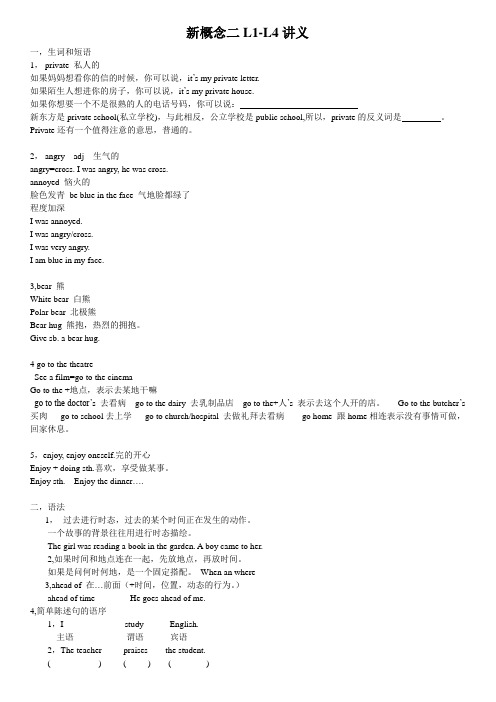
新概念二L1-L4讲义一,生词和短语1,private 私人的如果妈妈想看你的信的时候,你可以说,it’s my private letter.如果陌生人想进你的房子,你可以说,it’s my private house.如果你想要一个不是很熟的人的电话号码,你可以说:新东方是private school(私立学校),与此相反,公立学校是public school,所以,private的反义词是。
Private还有一个值得注意的意思,普通的。
2,angry adj 生气的angry=cross. I was angry, he was cross.annoyed 恼火的脸色发青be blue in the face 气地脸都绿了程度加深I was annoyed.I was angry/cross.I was very angry.I am blue in my face.3,bear 熊White bear 白熊Polar bear 北极熊Bear hug 熊抱,热烈的拥抱。
Give sb. a bear hug.4 go to the theatreSee a film=go to the cinemaGo to the +地点,表示去某地干嘛go to the doctor’s 去看病go to the dairy 去乳制品店go to the+人’s 表示去这个人开的店。
Go to the butcher’s 买肉go to school去上学go to church/hospital 去做礼拜去看病go home 跟home相连表示没有事情可做,回家休息。
5,enjoy, enjoy oneself.完的开心Enjoy + doing sth.喜欢,享受做某事。
Enjoy sth. Enjoy the dinner….二,语法1,过去进行时态,过去的某个时间正在发生的动作。
一个故事的背景往往用进行时态描绘。
新概念英语第2册课程讲义Lesson8
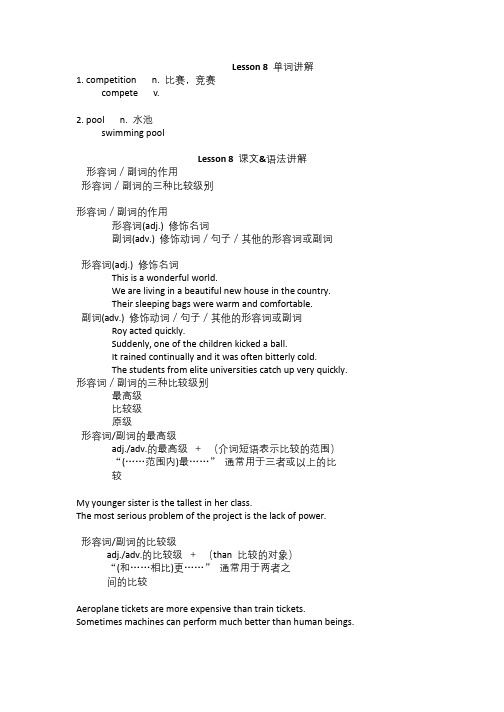
Lesson8单词讲解petition n.比赛,竞赛compete v.2.pool n.水池swimming poolLesson8课文&语法讲解形容词/副词的作用形容词/副词的三种比较级别形容词/副词的作用形容词(adj.)修饰名词副词(adv.)修饰动词/句子/其他的形容词或副词形容词(adj.)修饰名词This is a wonderful world.We are living in a beautiful new house in the country.Their sleeping bags were warm and comfortable.副词(adv.)修饰动词/句子/其他的形容词或副词Roy acted quickly.Suddenly,one of the children kicked a ball.It rained continually and it was often bitterly cold.The students from elite universities catch up very quickly.形容词/副词的三种比较级别最高级比较级原级形容词/副词的最高级adj./adv.的最高级+(介词短语表示比较的范围)“(……范围内)最……” 通常用于三者或以上的比较My younger sister is the tallest in her class.The most serious problem of the project is the lack of power.形容词/副词的比较级adj./adv.的比较级+(than比较的对象)“(和……相比)更……” 通常用于两者之间的比较Aeroplane tickets are more expensive than train tickets. Sometimes machines can perform much better than human beings.1.Joe Sanders has the most beautiful garden in our town.2.Nearly everybody enters for'The Nicest Garden Competition'each year,but Joe wins every time.3.Bill Frith's garden is larger than Joe's.Bill Frith's garden is larger than Joe's garden.Bill Frith's garden is larger than Joe.X4.Bill works harder than Joe and grows more flowers and vegetables,but Joe's garden is more interesting.5.Every year I enter for the garden competition too,and I always win a little prize for the worst garden in the town!Lesson8知识拓展本课重点:形容词/副词形容词副词的比较级/最高级形容词副词的比较级I am fatter than before.I am fatter than I was.I am fatter than I used to be.形容词副词的比较级The traffic block is more serious than before.The traffic block is more serious than it was.The traffic block is more serious than it used to be.形容词副词的比较级You are smarter than they think.The project took longer than I expected.形容词副词的比较级Bill’s garden is larger than Joe.Bill’s garden is larger than Joe’s.形容词副词的比较级The population of Beijing is larger than Tianjin.The population of Beijing is larger than that of Tianjin.形容词副词的比较级The visitors to London is more than Bath.The visitors to London is more than those to Bath.。
新概念英语第2册课程讲义Lesson41
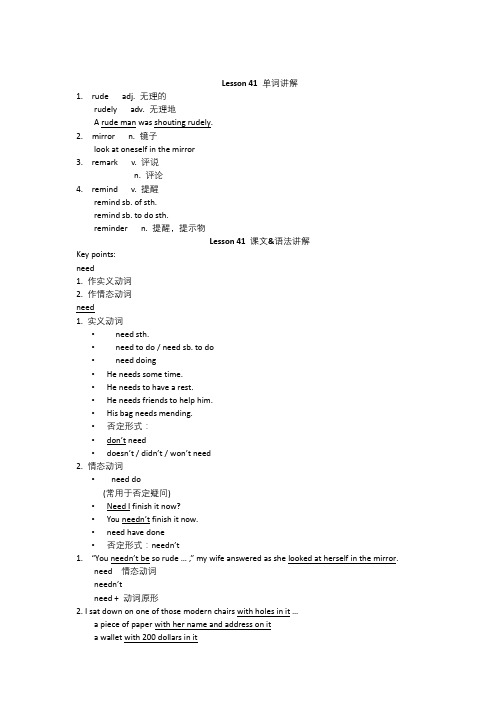
Lesson 41 单词讲解1. rude adj. 无理的rudely adv. 无理地A rude man was shouting rudely.2. mirror n. 镜子look at oneself in the mirror3. remark v. 评说n. 评论4. remind v. 提醒remind sb. of sth.remind sb. to do sth.reminder n. 提醒,提示物Lesson 41 课文&语法讲解Key points:need1. 作实义动词2. 作情态动词need1. 实义动词•need sth.•need to do / need sb. to do•need doing•He needs some time.•He needs to have a rest.•He needs friends to help him.•His bag needs mending.•否定形式:•don’t need•doesn’t / didn’t / won’t need2. 情态动词•need do(常用于否定疑问)•Need I finish it now?•You needn’t finish it now.•need have done•否定形式:needn’t1. “You needn’t be so rude …,” my wife answered as she looked at herself in the mirror.need 情态动词needn’tneed + 动词原形2. I sat down on one of those modern chairs with holes in it …a piece of paper with her name and address on ita wallet with 200 dollars in ita bus with 50 people on it3. We had been in the … shop for half an hour and my wife was still in front of the mirror.She is sitting in the front of the bus.4. “We mustn’t buy things we don’t need,” I remarked suddenly.mustn’t情态动词“禁止,不允许”things we don’t need 定语从句4. “We mustn’t buy things we don’t need,” I remarked suddenly.things we don’t need 定语从句need 实义动词don’t need need +things5. I regretted saying it almost at once.regret regretted regrettedregret sth.regret doing sth.6. “You needn’t have said that,” my wife answered.need have done本来需要做某事,但事实上没做(虚拟)needn’t have done本来不需要做某事,但事实上做了7. “I needn’t remind you of that … tie you bought yesterday.”remind sb. of sth.that … tie you bought yesterday定语从句6. “You needn’t have said that,” my wife answered.needn’t have done 本来不需要做某事,但事实上做了(虚拟)7. “I needn’t remind you of that … tie you bought yesterday.”needn’t do 不需要做,就真的不做(真实)7. “A man can never have too many ties.”“… a woman can’t have too many hats,”…8. My wife was wearing a hat that looked like a lighthouse.定语从句look likeShe looks like her father.Lesson 41 知识拓展高考的考点:情态动词needn’tI ______ use a clock to wake me up because at six o’clock each morning the train comes by my house.A. couldn’tB. mustn’tC. shouldn’tD. needn’t( 课标全国30)I ______ use a clock to wake me up because at six o’clock each morning the train comes by my house.A. couldn’tB. mustn’tC. shouldn’tD. needn’t( 课标全国30)It’s quite warm here; we ______ turn the heating on yet.A. couldn’tB. mustn’tC. needn’tD. w ouldn’t( 天津8)It’s quite warm here; we ______ turn the heating on yet.A. couldn’tB. mustn’tC. needn’tD. wouldn’t( 天津8)I ______ worry about my weekend – I always have my plans ready before it comes.A. can’tB. mustn’tC. daren’tD. needn’t( 上海28)I ______ worry about my weekend – I always have my plans ready before it comes.A. can’tB. mustn’tC. daren’tD. needn’t( 上海28)-What sort of house do you want to have? Something big?-Well, it ______ be big –that’s not important.A. mustn’tB. needn’tC. can’tD. won’t( 陕西9)-What sort of house do you want to have? Something big?-Well, it ______ be big –that’s not important.A. mustn’tB. needn’tC. can’tD. won’t( 陕西9)。
新概念英语第2册课程讲义Lesson18

Lesson18单词讲解ndlord n.店主,房东,业主,老板landowner n.2.bill n.账单,单据,清单/钞票/法案/广告pay the billUS dollar billsa crime billa bill boardLesson18课文&语法讲解本课重点:have的用法实义动词助动词have的用法实义动词1.“有”2.“吃喝玩乐做”助动词have的用法实义动词1.“有”I have a book.She has a car.He had a surprise.2.“吃喝玩乐做”have a meal have breakfast have some water have fun have a good timehave a swimhave的用法实义动词助动词(完成时态中)I have received a letter.She has bought a gift.He had left.have的用法(用法不同,变否定疑问也不同)实义动词助动词(完成时态中)I have received a letter.I have not received a letter.She has bought a gift.She has not bought a gift.He had left.He had not left.have的用法(用法不同,变否定疑问也不同)实义动词I have a book.I do not have a book. She has lunch.She does not have lunch. He had a good time.He did not have a good time.助动词(完成时态中)have的用法(用法不同,变否定疑问也不同)实义动词I have a book.I do not have a book. She has lunch.She does not have lunch. He had a good time.He did not have a good time.助动词(完成时态中)I have received a letter.I have not received a letter.She has bought a gift.She has not bought a gift.He had left.He had not left.have的用法练习:(判断用法,并变否定疑问)1.You have a lot of money.2.They had a swim yesterday.3.She has eaten breakfast.4.My dog had taken it into the garden.have的用法练习:(判断用法,并变否定疑问)1.You have a lot of money.2.They had a swim yesterday.3.She has eaten breakfast.4.My dog had taken it into the garden.have的用法练习:(判断用法,并变否定疑问)1.You have a lot of money.You do not have a lot of money.2.They had a swim yesterday.They did not have a swim yesterday.3.She has eaten breakfast.She has not eaten breakfast.4.My dog had taken it into the garden.My dog had not taken it into the garden.have的用法补充两点:“有”have=have got实义动词助动词You have a lot of money.=You have got a lot of money.do not have have not got have的用法补充两点:1.“有”have=have got2.have/has had had hadI had had lunch at a village.We have had trouble with the plan.It has had no effect.1.After I had had lunch…,I looked for my bag.have的过去完成时一般过去时先后2.I had left it on a chair beside the door and now it wasn’t there!beside the doorBesides this book,I have some others.3.As I was looking for it,the landlord came in.4.“Did you have a good meal?”he asked.5.“but I can’t pay the bill.I haven’t got my bag.”6.My dog had taken it into the garden.本课重点:have的用法实义动词助动词Lesson18知识拓展本课重点:if真实条件句(假设将来)Lesson18知识拓展本课重点:have的用法实义动词助动词have的用法实义动词“有”“吃喝玩乐做”助动词(完成时态中)have的用法He had a smoke after dinner.My friend Bill has had a headache.have的用法Their guest room has two big windows.We had had a long vacation after that.本课重点:have的用法实义动词助动词。
新概念英语第二册+Lesson+51+Reward+for+virtue+讲义
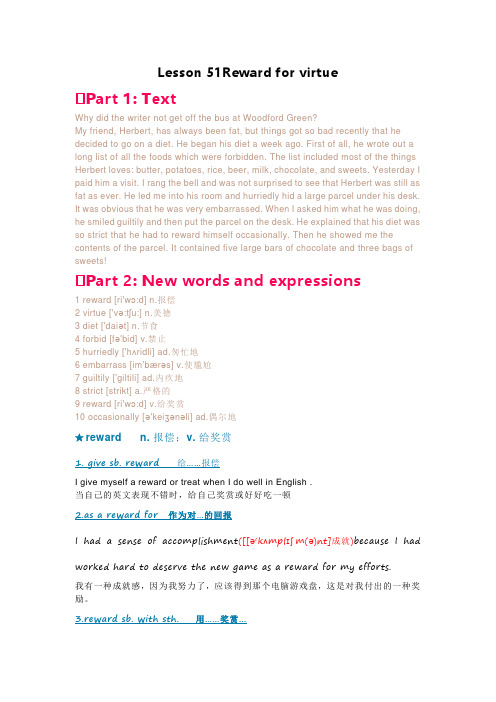
Lesson 51Reward for virtuePart 1: TextWhy did the writer not get off the bus at Woodford Green?My friend, Herbert, has always been fat, but things got so bad recently that he decided to go on a diet. He began his diet a week ago. First of all, he wrote out a long list of all the foods which were forbidden. The list included most of the things Herbert loves: butter, potatoes, rice, beer, milk, chocolate, and sweets. Yesterday I paid him a visit. I rang the bell and was not surprised to see that Herbert was still as fat as ever. He led me into his room and hurriedly hid a large parcel under his desk. It was obvious that he was very embarrassed. When I asked him what he was doing, he smiled guiltily and then put the parcel on the desk. He explained that his diet was so strict that he had to reward himself occasionally. Then he showed me the contents of the parcel. It contained five large bars of chocolate and three bags of sweets!Part 2: New words and expressions1 reward [ri'wɔ:d] n.报偿2 virtue ['və:tʃu:] n.美德3 diet ['daiət] n.节食4 forbid [fə'bid] v.禁止5 hurriedly ['hʌridli] ad.匆忙地6 embarrass [im'bærəs] v.使尴尬7 guiltily ['giltili] ad.内疚地8 strict [strikt] a.严格的9 reward [ri'wɔ:d] v.给奖赏10 occasionally [ə'keiʒənəli] ad.偶尔地★reward n. 报偿;v. 给奖赏1. give sb. reward 给……报偿I give myself a reward or treat when I do well in English .当自己的英文表现不错时,给自己奖赏或好好吃一顿2.as a reward for 作为对…的回报I had a sense of accomplishment([[ə‘kʌmplɪʃm(ə)nt]成就)because I had worked hard to deserve the new game as a reward for my efforts.我有一种成就感,因为我努力了,应该得到那个电脑游戏盘,这是对我付出的一种奖励。
新概念英语第二册 Lesson 04 An exciting trip讲义
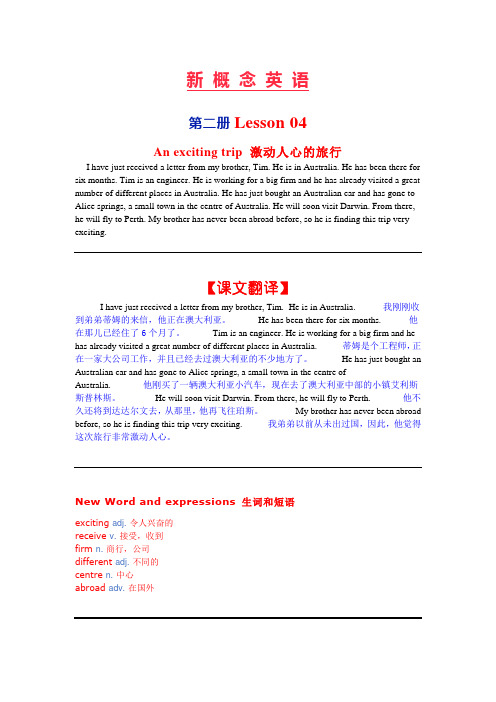
新概念英语第二册Lesson 04An exciting trip 激动人心的旅行I have just received a letter from my brother, Tim. He is in Australia. He has been there for six months. Tim is an engineer. He is working for a big firm and he has already visited a great number of different places in Australia. He has just bought an Australian car and has gone to Alice springs, a small town in the centre of Australia. He will soon visit Darwin. From there, he will fly to Perth. My brother has never been abroad before, so he is finding this trip very【课文翻译】I have just received a letter from my brother, Tim. He is in Australia. 我刚刚收到弟弟蒂姆的来信,他正在澳大利亚。
He has been there for six months. 他在那儿已经住了6个月了。
Tim is an engineer. He is working for a big firm and he has already visited a great number of different places in Australia. 蒂姆是个工程师,正在一家大公司工作,并且已经去过澳大利亚的不少地方了。
新概念英语第二册+Lesson+19+Sold+out!+讲义

Lesson 19 Sold out!Part 1: Text'The play may begin at any moment,' I said.'It may have begun already,' Susan answered.'I hurried to the ticket-office. 'May I have two tickets please ?' I asked. 'I'm sorry, we've sold out,' the girl said.'What a pity!' Susan exclaimed.Just then, a man hurried to the ticket-office.'Can I return these two tickets?' he asked.'Certainly,' the girl said.'Could I have those two tickets please ?' I asked.'Certainly, 'the girl said, 'but they are for next Wednesday's performance. 'I might as well have them,' I said sadly.Part 2: New words and expressions1. hurry ['hʌri] v.匆忙2. ticket office 售票处3. pity['piti] n.令人遗憾的事4. exclaim [ik'skleim] v.大声说5. return [ri'tə:n] v.退回6. sadly ['sædli] ad.悲哀地,丧气地Part 3: Notes on the text1、'The play may begin at anymoment,' I said.may 可能,表示推测at any moment 在任何时候, 随时policeman may arrive at any moment.天随时可能下雨.It may/might rain at any moment.at the moment =nowat that moment =just then (一般过去时)就在那时2.It may have begun already…...may+动词原形, 表示对现在、未来的推测She may be a model.may+ have done,表示对过去的推测She may have been a model.I may have watched TV last night.3、I hurried to the ticket office. 'May I have two tickets please?' I asked.★ hurried to+sp 匆匆忙忙地去某地★May 表示-请求,询问,说明一件事May I have your name? (比“What’s your name?”更有礼貌些)Can I have your name?Can和may表示-请求,询问的区别:Can 可以用在第一,二人称.may 只能用第一人称.4、'I'm sorry, we've sold out,' the girl said.sell out (店主)售完(某种货物),(货)被售完They have sold out of eggs.Tickets for tonight’s performance are sold out5.'What a pity!’ Susan exclaimed.感叹句 What a pity (it is)!exclaim 大声说,比shout正式。
新概念英语第2册课程讲义Lesson42

Lesson42单词讲解1.musical adj.精通音乐的,音乐的,悦耳的musical instrument乐器2.tune n.曲调play a tune3.glimpse n.一瞥(a quick look)have/get/catch+a glimpse of…We had a glimpse of the snake.4.difference n.差别tell the difference between…and…Lesson42课文&语法讲解本课重点:复习have的用法实义动词助动词have a+n.=对应的v.have的用法实义动词1.“有”2.“吃喝玩乐做”助动词(无实义,用于完成时态中)have的用法实义动词“做”n.v.have a walk=walkWe have a walk.=We walk.We had a walk yesterday.=We walked yesterday.have的用法实义动词“做”n.v.have a walk=walkhave a rest resthave a look lookhave a swim swimhave a sleep sleephave a+n.=对应的v.have的用法练习:(替换划线动词,用have a)1.I wanted to smoke.=have a smoke2.They swam in the sea this morning.=had a swim3.She is resting.=is having a rest4.He was looking at you.=was having a look1.As we had had a long walk…,we stopped at a square to have a rest.had had是have的过去完成时have a walk=walkhave a rest=resthave a+n.=对应的v.2.After a time,we noticed a snake charmer…,so we went to have a look at him.have a look=lookhave a look at…=look at…3.As soon as he saw us,he picked up a long pipe...and opened one of the baskets.I will pick you up on my way home.He picked up some Japanese when he worked there.4.When he began to play a tune,we had our first glimpse of the snake.5.It rose out of the basket…rise rose risenrise vi.The sun rises every day.raise vt.You raise me up.6.…when the snake charmer suddenly began to play jazz and modern pop songs. The snake,however,continued to“dance”slowly.7.The snake,however,continued to“dance”slowly.However,The snake continued to“dance”slowly.The snake continued to“dance”slowly,however. have的用法实义动词1.“有”2.“吃喝玩乐做”have a+n.=对应的v.助动词(无实义,用于完成时态中)Lesson42知识拓展本课重点:have的用法实义动词“有” “吃喝玩乐做”have a+n.=对应的v. 助动词(无实义,用于完成时态中)have a+n.=对应的v.Those two people fought in the bar last night.Those two people had a fight in the bar last night.have a+n.=对应的v.I was looking at the photographs.I was having a look at the photographs.have a+n.=对应的v.Yesterday I rode on a horse for the first time in my life. Yesterday I took a ride on a horse for the first time in my life. have的用法实义动词“有”“吃喝玩乐做”have a+n.=对应的v. 助动词(无实义,用于完成时态中)。
新概念英语第2册课程讲义Lesson33
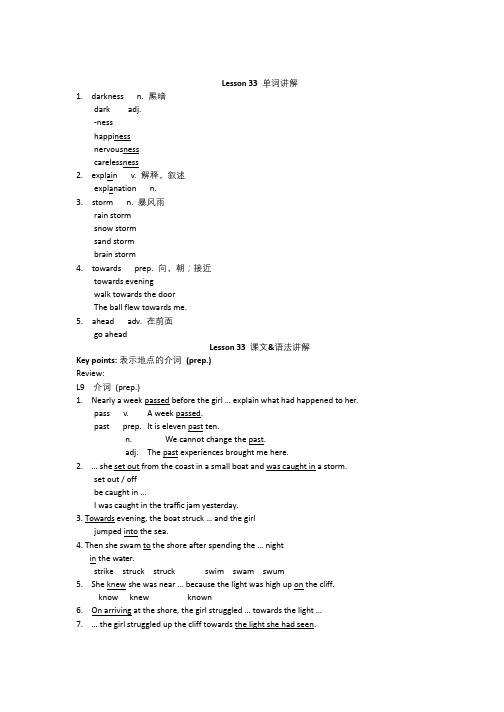
Lesson 33 单词讲解1. darkness n. 黑暗dark adj.-nesshappinessnervousnesscarelessness2. explain v. 解释,叙述explanation n.3. storm n. 暴风雨rain stormsnow stormsand stormbrain storm4. towards prep. 向,朝;接近towards eveningwalk towards the doorThe ball flew towards me.5. ahead adv. 在前面go aheadLesson 33 课文&语法讲解Key points: 表示地点的介词(prep.)Review:L9 介词(prep.)1. Nearly a week passed before the girl … explain what had happened to her.pass v. A week passed.past prep. It is eleven past ten.n. We cannot change the past.adj. The past experiences brought me here.2. … she set out from the coast in a small boat and was caught in a storm.set out / offbe caught in …I was caught in the traffic jam yesterday.3. Towards evening, the boat struck … and the girljumped into the sea.4. Then she swam to the shore after spending the … nightin the water.strike struck struck swim swam swum5. She knew she was near … because the light was high up on the cliff.know knew known6. On arriving at the shore, the girl struggled … towards the light …7. … the girl struggled up the cliff towards the light she had seen.the light (that/which) she had seen8. That was all she remembered.all (that) she remembered表示地点的介词(prep.) setout from the coast swam tothe shore towards the light shehad seen jumped into the seaout of darkness表示地点的介词(prep.)arriving at the shoreon the cliffin a small boat / in a storm / in hospital表示地点的介词(prep.)•Don’t throw the rubbish ______ the window.•Please come ______ the classroom and join us.•He is in Shanghai, and he will fly ______ Shanghai ______ Beijing.•She hopes that she will stand ______ the top of the highest mountain some day.•It is impolite to point ______ people.•I put the laptop ______ your bag.Lesson 33 知识拓展高考新题型单词拼写He tried to ________ (解释), but she wouldn’t listen.explain v. explanation n. ( 陕西) set out todo sth. set off to do sth.set about doing sth.set up + n.set down + n.We ______ to paint the whole house but finished only the front part that day.A. set aboutB. set upC. set outD. set down( 全国12)We ______ to paint the whole house but finished only the front part that day.A. set aboutB. set upC. set outD. set down( 全国12)Armed with the information you have gathered, you can ______ preparing your business plan.A. set outB. set aboutC. set offD. set up( 浙江15)Armed with the information you have gathered, you can ______ preparing your business plan.A. set outB. set aboutC. set offD. set up( 浙江15)-I probably shouldn’t have any more cake.-Oh, ______. It won’t kill you.A. go aheadB. hold on, pleaseC. you’re welcomeD. that’ll do( 辽宁35)-I probably shouldn’t have any more cake.-Oh, ______. It won’t kill you.A. go aheadB. hold on, pleaseC. you’re welcomeD. that’ll do( 辽宁35)阅读理解介词•Some of the best housing ________ London is never advertised but is passed on from one group of students to another by word of mouth.•( 浙江阅读B)阅读理解介词•Neither philosopher lived ________ times of peace, though there were more wars ________ Greece than ________ China.•( 江西阅读C)阅读理解介词•Andy rode slowly ________ his way to school, day-dreaming about the fishing trip that his father had promised him.•( 江西阅读A)阅读理解介词•________ the road to the harbour we could see the terrible destruction ________ the coast, but the harbour itself was in fairly good shape.•( 湖北阅读A)阅读理解介词•Joyce stayed ________ home, cooking and cleaning like a typical housewife of the time, though everything took three times as long.•( 陕西阅读C)。
新概念第二册讲义(完整资料)

be seated,please更为礼貌
seat是及物动词,后面有宾语
sit是不及物动词,后面不加宾语
seat后面会加人; seat sb; seat him; seat:让某人就座
sit he is sitting there.
you seat him;
conversation用的时候比talk正式,意思上往往不非常正式.
talk:可正式可不正式
dialogue:对话
China and Korea are having a dialogue.正式
chat:闲聊
gossip:嚼舌头
have a + talk/chat/dialogue/conversation/gossip名词变动词
★rudely adv.无礼地,粗鲁地
rude adj.
【TEXT】
Last week I went to the theatre. I had a very good seat. The play was very interesting. I did not enjoy it. A young man and a young woman were sitting behind me. They were talking loudly. I got very angry. I could not hear the actors. I turned round. I looked at the man and the woman angrily. They did not pay any attention. In the end, I could not bear it. I turned round again. "I can't hear a word!" I said angrily.
新概念英语第2册课程讲义Lesson60

Lesson60单词讲解1.future n.未来,前途in the(near/distant)futurelook forward to the future2.fair n.集市,展览会adj.公平的3.impatiently adv.不耐烦地patient adj.有耐心的n.患者,病人patiently adv.耐心地impatient adj.没有耐心的,不耐烦的Lesson60课文&语法讲解本课重点:复习表示将来的各种方式1.At a village fair,I decided to visit a fortune-teller called Madam Bellinsky.a school busa birthday presenta door keya crystal ball2.After I had given her some money,she looked into a crystal ball and said:过去完成时vs.一般过去时3.'A relation of yours is coming to see you.4.She will be arriving this evening and intends to stay for a few days.表示将来的方式:一般将来时will do am/is/are going to do现在进行时am/is/are doing 将来进行时will be doing5.The moment you leave this tent,you will get a big surprise.时间状语从句一般现在时表示将来时表示将来的方式:一般将来时will do am/is/are going to do现在进行时am/is/are doing将来进行时will be doing一般现在时do/does(时间或条件状语从句中)表示将来的方式:一般现在时do/does(时间或条件状语从句中)改错The boss will review your work after she will return from vacation next week.I’ll give you a call on my cell phone as soon as my plane will land.表示将来的方式:一般现在时do/does(时间或条件状语从句中)改错The boss will review your work after she will return from vacation next week.I’ll give you a call on my cell phone as soon as my plane will land.表示将来的方式:一般现在时do/does(时间或条件状语从句中)改错The boss will review your work after she will return from vacation next week.I’ll give you a call on my cell phone as soon as my plane will land.表示将来的方式:一般现在时do/does(时间或条件状语从句中)改错I don’t like my current job,but I’m going to stay with this company until I will find something better.表示将来的方式:一般现在时do/does(时间或条件状语从句中)改错I don’t like my current job,but I’m going to stay with this company until I will find something better.表示将来的方式:一般现在时do/does(时间或条件状语从句中)改错If it will be cold tomorrow,we will go to a movie.If it won’t be cold tomorrow,we’ll go to the beach.表示将来的方式:一般现在时do/does(时间或条件状语从句中)改错If it will be cold tomorrow,we will go to a movie.If it won’t be cold tomorrow,we’ll go to the beach.表示将来的方式:一般现在时do/does(时间或条件状语从句中)改错If it will be cold tomorrow,we will go to a movie.If it won’t be cold tomorrow,we’ll go to the beach.6.As soon as I went outside,I forgot all about Madam…because my wife hurried towards me.7.'Where have you been hiding?'...8.'Your sister will be here in less than an hour and we must be at the station to meet her...'本课重点:复习表示将来的各种方式一般将来时will do am/is/are going to do现在进行时am/is/are doing 将来进行时will be doing一般现在时do/does(时间或条件状语从句中)Lesson60知识拓展本课重点:复习表示将来的各种方式本课重点:复习表示将来的各种方式•一般将来时will do am/is/are going to do•现在进行时am/is/are doing•将来进行时will be doing•一般现在时do/does(时间或条件状语从句中)•A lifeboat_____(set)out tomorrow to search for the shipwreck.•The crew_____(send)radio messages to the wreck until they_____(receive)a signal from the men on board.•As soon as they_____(receive)a signal,they_____(try)and find the wreck with powerful searchlights.•The moment the crew_____(locate)the wreck,they_____(fire)a special gun which_____(carry)a rope from the life boat to the sinking ship.•If the sea is rough,they____(pour)oil on the water.•They are sure to succeed,but if they fail,a helicopter_____(send)out the next day.•Helicopters are very useful for rescue work,but they cannot be used at night.。
新概念英语第2册课程讲义Lesson64

Lesson64单词讲解1.port n.港口airport n.空港,飞机场2.ventilate v.通风well-ventilated adj.通风良好的ventilation n.通风3.invasion n.入侵,侵略This is the invasion of my privacy.invade v.入侵,侵略,侵袭Hitler invaded Poland in September,1939.4.officially adv.正式地,官方地Officially,the election campaign will begin in July.The gallery was officially open last month.5.connect v.连接connect…to/with…The bridge connected this small town to the big big city.connection n.6.European adj.欧洲的,欧洲人的n.欧洲人European continent欧洲大陆European Union欧盟Europe n.欧洲euro n.欧元Lesson64课文&语法讲解本课重点:if非真实条件句(虚拟)--假设过去宾语从句的虚拟1.In1858,a French engineer…arrived in England with a plan for a twenty-one-mile tunnel under the English Channel.简单句同位语with a plan for a…tunnel…2.He said that it would be possible to build a platform in the centre of the Channel.that引出宾语从句to do真正的主语it形式主语3.The tunnel would be well-ventilated if tall chimneys were built above sea level.4.In1860,a better plan was put forward by an Englishman...put forward提前,提出put forward a plan/proposalput forward some new ideas5.He suggested that a double railway-tunnel should be built.suggest表示“建议”,其后宾语从句要虚拟从句中谓语动词=(should)+动词原形表示“建议/命令/要求”,其后宾语从句都要虚拟:suggest,advise,propose,recommend/order/ask,demand,insist,request…The engineers proposed that they_____(look)at the design again.The professor recommended we_____(look)for the information in the library.表示“建议/命令/要求”,其后宾语从句都要虚拟:suggest,advise,propose,recommend/order/ask,demand,insist,request…The teacher always suggests the students_____(go)over the text before the test. The workers demanded they_____(give)the wages they should get.6.This would solve the problem of ventilation,for if a train entered this tunnel,it would draw in fresh air behind it.6.This would solve the problem of ventilation,for if a train entered this tunnel,it would draw in fresh air behind it.7.如果不是因为那时英国人害怕入侵,隧道早已建成了。
新概念英语第2册课程讲义Lesson39

Lesson 39 单词讲解1. operation n. 手术have an operationn. 操作,运转,经营business operationn. 行动rescue operationmilitary operation2. successful adj. 成功的successfully adv.success n.succeed v.3. alone adj. 独自的adv.lonely adj. 偏僻的,人迹罕至的,孤单寂寞的The old lady lived _______, so she felt _______.Leave me alone!Lesson 39 课文&语法讲解Key points: 直接引语变间接引语(宾语从句)他说:“我是笨蛋。
”直接引语他说我是笨蛋。
他说他是笨蛋。
间接引语He says, “I am a fool.”直接引语He says ________________ . 间接引语•直接引语变间接引语1. 引号打开变宾语从句看引号中的句子类型2. 设身处地转换角度–人称–时态–代词或状语等•宾语从句1. He will help us.2. What did you say?3. Is she coming here?We know ________________________.•直接引语变间接引语1. 引号打开变宾语从句看引号中的句子类型2. 设身处地转换角度–人称–时态–代词或状语等直接引语变间接引语(宾语从句)“I am inquiring a certain patient ...”Mr. Gilbert said _____________________________________.直接引语变间接引语(宾语从句)“When will Mr. Gilbert be allowed to go home? ”He then asked直接引语变间接引语(宾语从句)“Was my operation successful ? ”He asked his doctor to tell him______________________________________.1. … he asked his doctor to tell him whether his operation had been successful …2. … Mr. Gilbert said (that) he was inquiring a … patient …3. He asked if Mr. Gilbert’s operation had been successful …4. … the doctor told him that it had been (successful).5. He then asked when Mr. Gilbert would be allowed to go home …6. … the doctor told him that he would have to stay in hospital for another two weeks.7. Then Dr. Millington asked the caller if he was a relative of the patient.Lesson 39 知识拓展Key points:直接引语变成间接引语(宾语从句)复习宾语从句写法:①陈述句变宾语从句?复习宾语从句写法:①陈述句变宾语从句?You are right.I know __________________.复习宾语从句写法:②特殊疑问句变宾语从句?What will she say?I know __________________.复习宾语从句写法:③一般疑问句变宾语从句?Is he happy?I know ________________________.复习宾语从句写法:①I know that you are right.②I know what she will say.③I know whether he is happy.练习宾语从句•我承诺我会帮助你。
新概念英语第2册课程讲义Lesson46
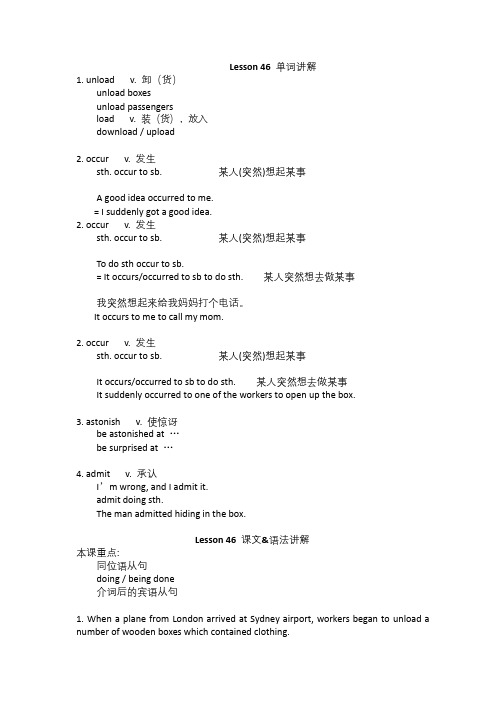
Lesson46单词讲解1.unload v.卸(货)unload boxesunload passengersload v.装(货),放入download/upload2.occur v.发生sth.occur to sb.某人(突然)想起某事A good idea occurred to me.=I suddenly got a good idea.2.occur v.发生sth.occur to sb.某人(突然)想起某事To do sth occur to sb.=It occurs/occurred to sb to do sth.某人突然想去做某事我突然想起来给我妈妈打个电话。
It occurs to me to call my mom.2.occur v.发生sth.occur to sb.某人(突然)想起某事It occurs/occurred to sb to do sth.某人突然想去做某事It suddenly occurred to one of the workers to open up the box.3.astonish v.使惊讶be astonished at…be surprised at…4.admit v.承认I’m wrong,and I admit it.admit doing sth.The man admitted hiding in the box.Lesson46课文&语法讲解本课重点:同位语从句doing/being done介词后的宾语从句1.When a plane from London arrived at Sydney airport,workers began to unload a number of wooden boxes which contained clothing.2.No one could account for the fact that one of the boxes was extremely heavy.同位语从句含义:一个句子作同位语,解释说明前面名词位置:所解释的抽象名词后,如fact,news,theory,idea,suggestion,report…写法:同宾语从句(最常用的结构是that+完整的陈述句)2.No one could account for the fact that one of the boxes was extremely heavy.同位语从句我毫不怀疑他将会帮我的忙。
